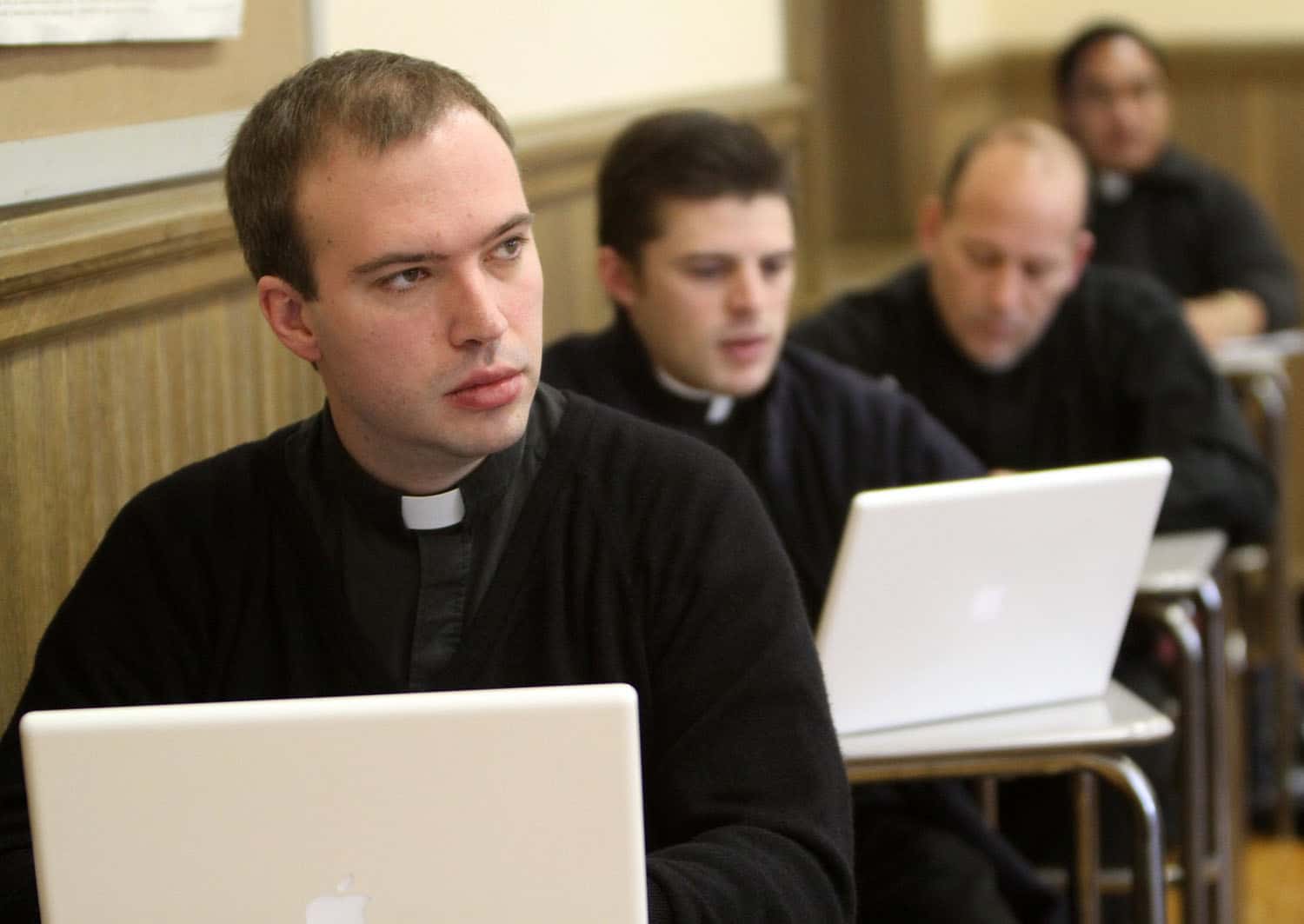Is consolidation inevitable for our American seminaries? “All our other educational institutions, as well as parishes, are biting the bullet,” Cardinal Timothy Dolan recently wrote. “It is time we in charge of seminaries do the same thing.” In a recent op-ed in America Magazine, the cardinal made waves with a call for a major overhaul of Catholic seminaries in the United States. His idea? Fewer but better-equipped seminaries strategically located across the nation. He noted that from Boston to Washington, D.C., there are eight seminaries training men in theology. In fact, as the cardinal said, there is an incongruity between where the seminaries are (two-thirds of American seminaries are in the Northeast) and where the Catholic population is growing, in the South and West.
From Cardinal Dolan’s perspective, it would be better to consolidate those institutions. It’s more fiscally responsible, the cardinal argues, and would make it easier to run institutions that offer truly excellent formation. Many, like the celebrated American Catholic historian Msgr. John Tracy Ellis, agree.
The risks of consolidation
Others disagree: They say there’s a risk behind such proposals for consolidation. “Although a consolidation model of reform represents a worthy attempt to preserve solidarity in quality and faithfulness of teaching, it obtains this at the cost of ecclesiastical subsidiarity,” write Stephen J. Loughlin and Matthew Kuhner in a recent article that appeared online at OurSundayVisitor.com. The two administrators at St. Bernard’s School of Theology and Ministry in Rochester argue that local institutions help bridge the gap between clergy and laity, making the transition from formation to ministry easier for newly assigned priests.
Loughlin and Kuhner argue that just as a natural father maintains his role while relying on the community to help raise his children, a bishop, irrespective of resources, ought never to relinquish his paternal role in forming seminarians. Local formation keeps seminarians connected to the bishop and the diocese they will eventually serve.
Elsewhere in the world, even more innovative models have been adopted. In Paris, for example, seminarians live in various rectories and houses and travel to the seminary building for instruction. In these smaller residences of 8 to 15 men, seminarians live a routine shared with parish priests in environments more like the parishes where they will enter ministry.
Cardinal Jean-Marie Lustiger wrote, “In the last few decades the ‘monastic’ model of the post-Tridentine seminaries had often turned, if discipline still prevailed, into something military-like, and if discipline was found no longer enforceable, into the style of mere hotels or students’ residences.” Living in the city in smaller houses, according to Cardinal Lustiger, prompts the seminarians to realize how radical the Gospel is and inspires them to pursue austerity and self-mastery.
Three factors to consider
So should dioceses close or merge their seminaries? This decision is far from simple, but as our bishops contemplate what future seminary life might look like, three critical points must guide their discernment: human formation, pastoral formation and stewardship of resources.
The Church’s vision of formation begins not with seminary structures but with individual bishops and their dioceses. Bishops are supposed to be the primary formators of their seminarians. Even when a seminarian studies at a regional or national seminary, the institution doesn’t replace the bishop’s responsibility; it supports it. Any reform should, therefore, start by asking: How can a bishop in a particular diocese authentically and integrally form his seminarians?
At the heart of this fatherly leadership is human formation, which involves much more than academic proficiency; it’s about nurturing the personal and spiritual growth of seminarians so that they become healthy priests with an integrated community life. Human formation lays the groundwork for future priests to become empathetic, self-aware, and psychologically mature pastors. It’s essential for seminaries, whether standalone, merged or otherwise re-imagined, to maintain an environment conducive to such growth.
We should ask, too, whether our seminaries adequately equip seminarians with the skills necessary to minister effectively in diverse and often challenging real-world scenarios. This aspect of formation involves practical training, such as parish internships, hospital chaplaincies, and community service, which are indispensable for preparing future priests. It should also include training in administration and financial management. As bishops evaluate the feasibility of seminary consolidation, they must ensure that these opportunities for practical training remain abundant and accessible. The proximity of seminaries to various pastoral settings, the availability of diverse ministry experiences and the quality of mentorship should be carefully considered.
Finally, stewardship is a crucial factor in this decision-making process. This involves responsible management of the Church’s resources — financial, human, and physical. Economic efficiency, while desirable, should not be the sole determinant in the decision to close or merge seminaries. The most workable creative solutions will be those that combine efficiency with real improvements to formation.
As bishops face the challenging decision of whether to close or merge seminaries, they must balance these and other considerations carefully. Their decision should not solely be a financial or logistical one, but the result of a holistic approach that gives priority to the comprehensive formation of future priests. The Church has an opportunity to do something dynamic and creative, and we shouldn’t miss it. The Church’s future depends on it, as does the spiritual well-being of the countless faithful future priests will one day serve.







